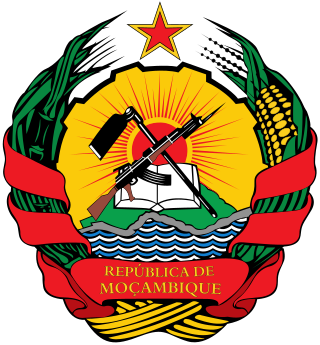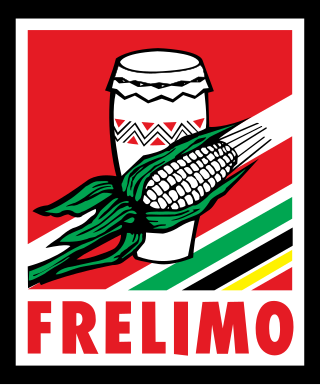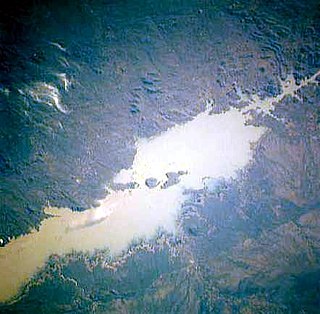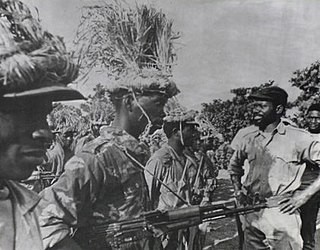Related Research Articles

Mozambique, officially the Republic of Mozambique, is a country located in southeast Africa bordered by the Indian Ocean to the east, Tanzania to the north, Malawi and Zambia to the northwest, Zimbabwe to the west, and Eswatini and South Africa to the southwest. The sovereign state is separated from the Comoros, Mayotte and Madagascar by the Mozambique Channel to the east. The capital and largest city is Maputo.
Mozambique was a Portuguese colony, overseas province and later a member state of Portugal. It gained independence from Portugal in 1975.

Politics in Mozambique takes place in a framework of a semi-presidential representative democratic republic, whereby the President of Mozambique is head of state and head of government in a multi-party system. Executive power is exercised by the government. Legislative power is vested in both the government and the Assembly of the Republic.

The economy of Mozambique is $14.396 billion by gross domestic product as of 2018, and has developed since the end of the Mozambican Civil War (1977–1992). In 1987, the government embarked on a series of macroeconomic reforms, which were designed to stabilize the economy. These steps, combined with donor assistance and with political stability since the multi-party elections in 1994, have led to dramatic improvements in the country's growth rate. Inflation was brought to single digits during the late 1990s, although it returned to double digits in 2000–02. Fiscal reforms, including the introduction of a value-added tax and reform of the customs service, have improved the government's revenue collection abilities.

Maputo is the capital, and largest city of Mozambique. Located near the southern end of the country, it is within 120 kilometres of the borders with Eswatini and South Africa. The city has a population of 1,088,449 distributed over a land area of 347.69 km2 (134.24 sq mi). The Maputo metropolitan area includes the neighbouring city of Matola, and has a total population of 2,717,437. Maputo is a port city, with an economy centered on commerce. It is also noted for its vibrant cultural scene and distinctive, eclectic architecture. Maputo was formerly named Lourenço Marques until 1976.

Samora Moisés Machel was a Mozambican military commander and political leader. A socialist in the tradition of Marxism–Leninism, he served as the first President of Mozambique from the country's independence in 1975.

FRELIMO is a democratic socialist political party in Mozambique. It has been the country's ruling party since 1977.

Cabo Delgado is the northernmost province of Mozambique. It has an area of 82,625 km2 (31,902 sq mi) and a population of 2,320,261 (2017). As well as bordering Mtwara Region in the neighboring country of Tanzania, it borders the provinces of Nampula and Niassa. The region is an ethnic stronghold of the Makonde tribe, with the Makua and Mwani as leading ethnic minorities.

The flag of Mozambique is the national flag of the Republic of Mozambique that was adopted on 1 May 1983. It is a tricolor flag with white fimbriations and a red triangle. Teal stands for the riches of the land, the white fimbriations signify peace, black represents the African continent, yellow symbolises the country's minerals, and red represents the struggle for independence. It includes the image of a Kalashnikov rifle with a bayonet attached to the barrel crossed by a hoe, superimposed on an open book. The rifle stands for defence and vigilance, the open book symbolises the importance of education, the hoe represents the country's agriculture, and the star symbolizes the spirit of the international solidarity of the Mozambican people. It is one of four national flags among UN member states that feature a gun, along with those of Guatemala, Haiti and Bolivia, but is the only one of the four to feature a modern firearm instead of cannons or single-shot rifles.

The Cahora Bassa lake—in the Portuguese colonial era known as Cabora Bassa, from Nyungwe Kahoura-Bassa, meaning "finish the job"—is Africa's fourth-largest artificial lake, situated in the Tete Province in Mozambique. In Africa, only Lake Volta in Ghana, Lake Kariba, on the Zambezi upstream of Cahora Bassa, and Egypt's Lake Nasser are bigger in terms of surface water.

Armando Emílio Guebuza is a Mozambican politician who was the third President of Mozambique from 2005 to 2015.

The Mozambican Civil War was a civil war fought in Mozambique from 1977 to 1992. Like many regional African conflicts during the late twentieth century, the impetus for the Mozambican Civil War included local dynamics exacerbated greatly by the polarizing effects of Cold War politics. The war was fought between Mozambique's ruling Marxist Mozambique Liberation Front (FRELIMO), the anti-communist insurgent forces of the Mozambican National Resistance (RENAMO), and a number of smaller factions such as the PRM, UNAMO, COREMO, UNIPOMO, and FUMO.

Education in Mozambique is organized by three main stages: primary education, secondary education and higher education. Although having a national public education system, several educational programmes and initiatives in Mozambique are mainly funded and supported by the international community.

The Mozambican War of Independence was an armed conflict between the guerrilla forces of the Mozambique Liberation Front or FRELIMO and Portugal. The war officially started on 25 September 1964, and ended with a ceasefire on 8 September 1974, resulting in a negotiated independence in 1975.
The culture of Mozambique is in large part derived from its history of Bantu, Swahili, and Portuguese rule, and has expanded since independence in 1975. The majority of its inhabitants are black Africans. Its main language is Portuguese. Its median religion is Roman Catholicism, but only about 40% of the inhabitants are Christian. It has a rich history in the areas of arts, cuisine, and entertainment.
Portuguese Mozambicans are Mozambican-born descendants of Portuguese settlers.

The People's Republic of Mozambique was a socialist state that existed in present-day Mozambique from 1975 to 1990.

Mozambique–Portugal relations are the bilateral relations between the Republic of Mozambique and the Portuguese Republic. Both nations are members of the Community of Portuguese Language Countries and the United Nations.
The sport of football in the country of Mozambique is run by the Mozambican Football Federation. The association administers the national football team, as well as the national league. Football is the most popular sport in the country.

Mozambican nationality law is regulated by the Constitution of Mozambique, as amended; the Nationality Law and Nationality Regulation, and their revisions; and various international agreements to which the country is a signatory. These laws determine who is, or is eligible to be, a national of Mozambique. The legal means to acquire nationality, formal legal membership in a nation, differ from the domestic relationship of rights and obligations between a national and the nation, known as citizenship. Nationality describes the relationship of an individual to the state under international law, whereas citizenship is the domestic relationship of an individual within the nation. Mozambican nationality is typically obtained under the principle of jus soli, i.e. by birth in the territory, or jus sanguinis, i.e. by birth in Mozambique or abroad to parents with Mozambican nationality. It can be granted to persons with an affiliation to the country, or to a permanent resident who has lived in the country for a given period of time through naturalization.
References
- ↑ Pitcher, M. Anne (2002). Transforming Mozambique: The Politics of Privatization, 1975–2000. Cambridge University Press. p. 47. ISBN 9781139434942.
- ↑ "The Allure of Mozambique". The Wall Street Journal. 10 October 2013. Retrieved 23 November 2015.